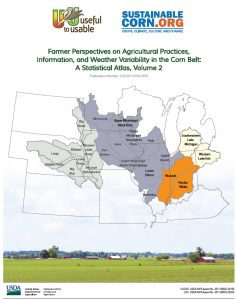 Teams from the Useful to Usable (U2U) and Climate and Corn-based Cropping Systems CAP (CSCAP) projects have released the second atlas in a series presenting data from a survey of Corn Belt farmers that was conducted in early 2012.
Teams from the Useful to Usable (U2U) and Climate and Corn-based Cropping Systems CAP (CSCAP) projects have released the second atlas in a series presenting data from a survey of Corn Belt farmers that was conducted in early 2012.
Farmer Perspectives on Agricultural Practices, Information, and Weather Variability in the Corn Belt: A Statistical Atlas, Volume 2 looks at farmers’ specific behaviors, beliefs about climate and weather, and the tools they utilize to make farm decisions. Specific information covered includes the timing of farming practices and farming decisions, whether and how farmers use weather information when making farming decisions, a detailed look at the influence of agricultural advisors in farmer decision making processes, farmers’ personal experiences regarding weather and risks, additional information on farmers’ attitudes and beliefs regarding climate change, and plans and efforts of farmers to adapt to and manage for weather and climate variability and risk.
Similar to the first atlas this latest publication provides survey results by watershed, and each section contains a tabulated presentation of survey data along with a series of maps that visually represent the distribution of responses across the entire study region.
This publication is available at https://purr.purdue.edu/publications/1965.
Citation:
Church, Sarah P., Tonya Haigh, Melissa Widhalm, Linda Stalker Prokopy, J. Gordon Arbuckle Jr., Jon Hobbs, Tricia Knoot, Cody Knutson, Adam Loy, Amber Saylor Mase, Jean McGuire, Lois Wright Morton, John Tyndall, 2015. Farmer Perspectives on Agricultural Practices, Information, and Weather Variability in the Corn Belt: A Statistical Atlas, Volume 2. CSCAP-0184-2015. West Lafayette, IN. Purdue University Research Repository. doi:10.4231/R79W0CFS
